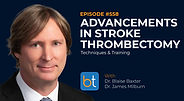BackTable / VI / Podcast / Episode #98
Using AI to Improve Stroke Care
with Dr. Ameer Hassan
Interventional Neurologist Ameer Hassan and Interventional Radiologist Sabeen Dhand discuss how utilizing Artificial Intelligence (AI) can reduce transfer times and length of stay in a hub and spoke model for Stroke Care.
This podcast is supported by:
Be part of the conversation. Put your sponsored messaging on this episode. Learn how.

BackTable, LLC (Producer). (2020, December 7). Ep. 98 – Using AI to Improve Stroke Care [Audio podcast]. Retrieved from https://www.backtable.com
Stay Up To Date
Follow:
Subscribe:
Sign Up:
Podcast Contributors
Synopsis
In this episode, Dr. Ameer Hassan joins Dr. Sabeen Dhand to discuss the use of artificial intelligence (AI) to improve stroke care. We explain the hub and spoke model and how the primary stroke centers communicate in the hub. Dr. Hassan describes how the system determines which center a stroke patient will go to.
We discuss how the system optimizes the transfer from spoke to hub and how comparing trends in stroke patients allowed them to speed up the process. We explain how AI is used in stroke care using decision trees and deep learning. We discuss the benefits of using AI to remove steps and sending push notifications to phones, allowing radiologists to review imaging quicker.
Resources
SAGE journals; Interventional Neuroradiology
https://journals.sagepub.com/doi/full/10.1177/1591019920953055
Early experience utilizing artificial intelligence shows significant reduction in transfer times and length of stay in a hub and spoke model
The Materials available on BackTable are for informational and educational purposes only and are not a substitute for the professional judgment of a healthcare professional in diagnosing and treating patients. The opinions expressed by participants of the BackTable Podcast belong solely to the participants, and do not necessarily reflect the views of BackTable.










